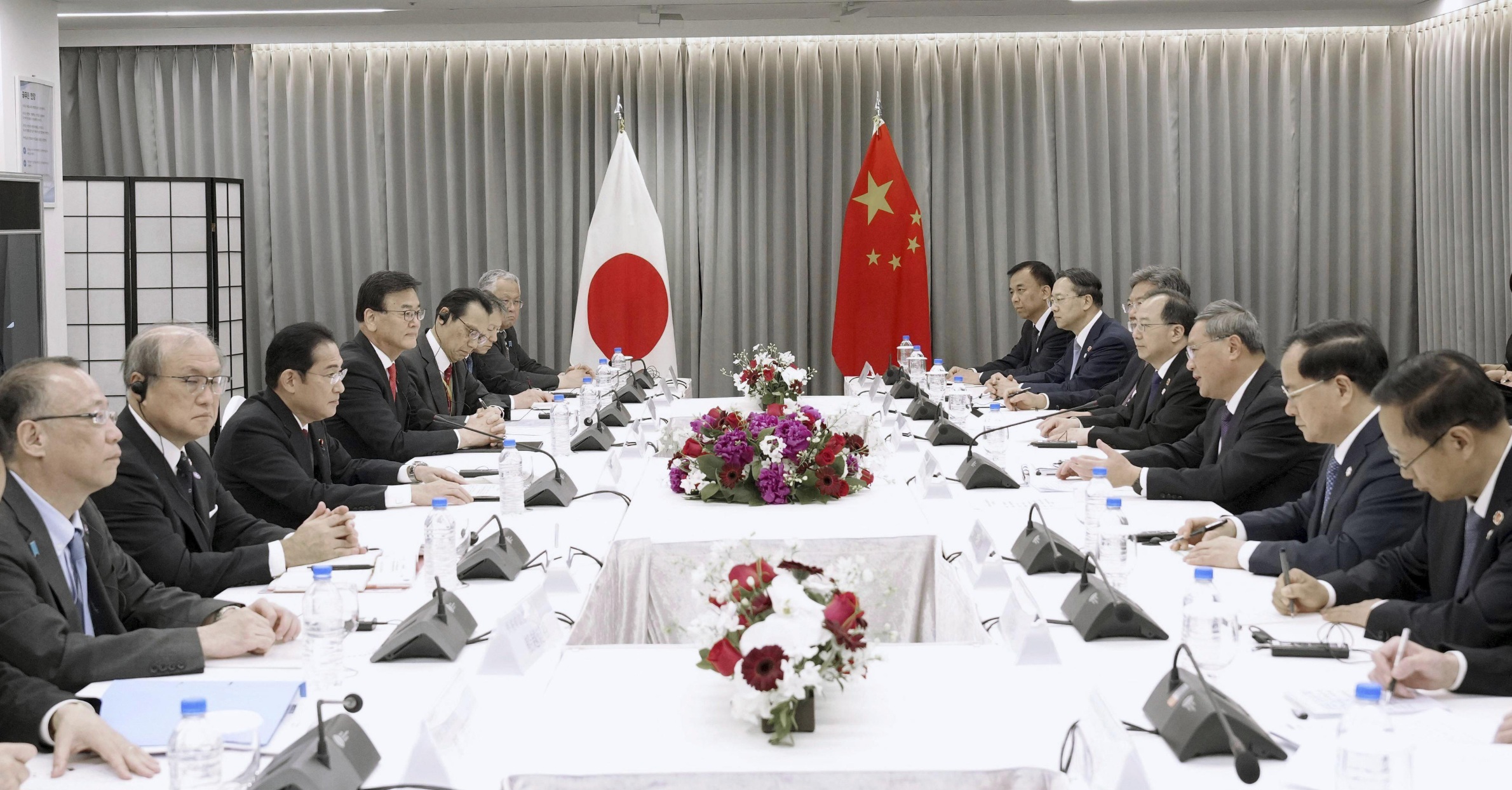SEOUL, South Korea (AP) — China’s premier agreed Monday to revive three-way cooperation with South Korea and Japan in the face of shared challenges, but issued a veiled rebuke against the two countries’ expanding security cooperation with the United States.
Chinese Premier Li Qiang met South Korean President Yoon Suk Yeol and Japanese Prime Minister Fumio Kishida in Seoul in what was their countries’ first such trilateral meeting in more than four years.
Many experts say just restarting the countries’ highest-level annual meeting and agreeing on the need to improve ties is a positive sign for cooperation among the three Northeast Asian neighbours, as they all face economic uncertainties caused by wars and instability around the world. But how drastically their cooperation will be promoted is unknown as the three countries have a range of long-running complex issues.
In a joint news conference after the meeting, Li said China wants to cooperate with South Korea and Japan on economic issues, especially on supply chains and the restart of talks on a three-way free trade deal.
Yoon said the three leaders agreed to promote people-to-people and cultural exchanges, establish safe supply chain networks and work together to tackle shared environmental, health and other issues. Kishida said the three countries share a big responsibility for regional peace and that Japan will chair the next round of the trilateral leaders’ meeting.

Despite the seemingly amicable mood of the meeting, however, Li at one point expressed Chinese uneasiness about Japan and South Korea’s moves to beef up their security partnership with the US, which Beijing views as an attempt to form a bloc to contain China.
“We need to have honest dialogues to better enhance trust and resolve doubts. We must uphold the spirit of strategic autonomy and maintain our bilateral relations,” Li said in comments at the start of the meeting with Yoon and Kishida. “We need to promote multipolarity in the world and oppose the formation of blocs or camps.”
China is wary of Japan’s plan to purchase 400 US Tomahawk long-range cruise missiles and allow repair and maintenance of US warships in Japan to support their operations in the western Pacific. The expansion of military drills among South Korea, the US and Japan have also drawn protests from China.
The trilateral meeting was also briefly overshadowed by North Korea’s abrupt notification to Japan of its plan to launch a satellite by early next week, an apparent bid to place its second spy satellite into orbit.
The UN bans any satellite launches by North Korea, viewing them as disguised tests of the country’s long-range missile technology. North Korea has said it needs spy satellites to better monitor South Korea and the US and enhance the precision-attack capabilities of its missiles.
Yoon called for stern international action if North Korea goes ahead with the launch. Kishida urged North Korea to withdraw its satellite launch. But Li didn’t mention the launch plan as he offered general comments about promoting peace and stability on the Korean Peninsula through a political resolution.
South Korea, Japan and the US have long urged China — North Korea’s major ally and economic pipeline — to use its leverage to persuade the North to abandon its nuclear ambitions. But China is suspected of avoiding fully implementing UN sanctions on North Korea and sending clandestine aid shipments to its impoverished, sociality neighbor to stay afloat and continue to serve as a bulwark against US influence on the Korean Peninsula.
In a bilateral meeting with Li on Sunday, Yoon asked China to contribute to promoting peace on the Korean Peninsula, while speaking about North Korea’s nuclear program and its deepening military ties with Russia.
After meeting with Li on Sunday, Kishida also told reporters that he expressed serious concerns about the situations in the South China Sea, Hong Kong and China’s northwestern Xinjiang region. He said Japan was closely monitoring developments on self-governed Taiwan as well.
Kishida referred to China’s military assertiveness in the South China Sea, clampdowns on pro-democracy movements in Hong Kong and human rights abuses against minorities in Xinjiang. Last week, China also launched a large military exercise around Taiwan to show its anger over the inauguration of the island’s new president who refuses to accept its insistence that Taiwan is part of China.
On Monday, Li still didn’t respond directly to the outside accusations against the Chinese actions in the South China Sea or surrounding Taiwan.
“China, Japan and South Korea should appropriately handle sensitive issues and points of difference, and take care of each other’s core interests and major concerns,” Li said. “And truly construct a real multilateralism.”
The three Asian nations together represent about 25 per cent of global gross domestic product, and they are closely linked to one another economically and culturally. But their relations have suffered on-again, off-again setbacks owing to issues stemming from Japan’s wartime aggression. China’s ambitions of greater global influence and a US push to bolster its Asian alliances have also threatened to hurt ties among the three Asian countries.
The China-South Korea-Japan trilateral meeting was supposed to happen annually following their first meeting in 2008. But the sessions stalled since the last one in December 2019 in Chengdu, China because of the COVID-19 pandemic and often-complicated ties among the three countries.
Experts say the three countries all want better relations. China is the biggest trading partner for both South Korea and Japan. Analysts say China likely thinks any further strengthening of the South Korea-Japan-US security ties would not serve its national interests.



















































